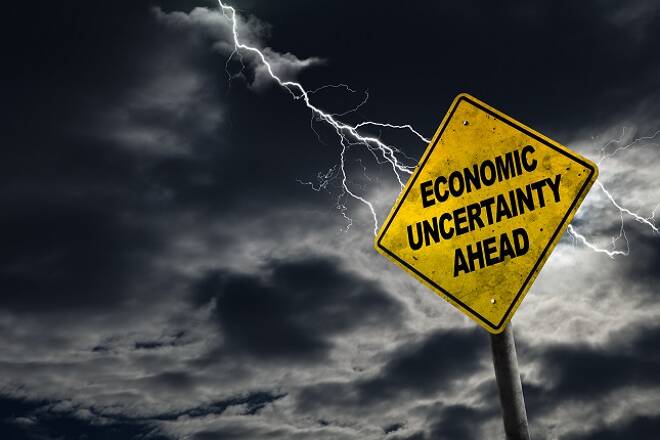Advertisement
Advertisement
Geopolitical Risk – Is There an End in Sight?
By:
Geopolitical risk continues to test market risk sentiment. As one risk abates, another is just around the corner. Celebrating progress in trade talks may prove premature...
Since late 2016, geopolitical risk has been a constant threat to the global economy and global financial markets.
The year 2016 not only coincided with the inauguration of U.S President Trump but also Britain’s decision to depart from the EU.
While the EU referendum result had a material impact on the Pound and the stability of the EU, Trump’s immediate impact was positive for the global financial markets.
This has not necessarily been the case since last year, however, leaving the markets to navigate through a multitude of minefields over the last 18 months.
Brexit
On Monday, EU member states approved Britain’s request to extend the Brexit deadline to 31st January 2020.
The approval came in spite of some push back by French President Macron, who continues to push to become the voice of Europe.
While the extension is good news, with Britain having been due to leave the EU on Thursday, even greater uncertainty now shrouds Britain and the Pound.
The Conservative Party called for a general election on 12th December, which will be the first December election since 1923.
The Lib Dems and SNP had looked to bring the election data forward but, after some scrapping, Johnson got his way.
While some suggest that Johnson’s failure to deliver Brexit by 31st October will hurt at the polls, the fact that he was able to renegotiate a deal and have it approved in Parliament should be viewed positively by the electorate.
After all, it is the opposition party, someone splintered, which led to Johnson’s loss of the Brexit schedule.
And, unlike the Labour Party, the Tories are once more united after months of fragmentation.
So, while some would have been hoping to move on from the more than 3-years of Brexit uncertainty, there are 3 more months of pain to come.
On the positive side, there is light at the end of a 3-month long tunnel. A December general election may well shorten that or at least ensure it doesn’t extend further…
Assuming the House of Lords approve the Bill, a 5-week campaign trail and a plethora of polls will give the Pound a rollercoaster of a ride.
The U.S – China Trade War
Since the summer of 2018, the U.S and China have continued to fight it out in a trade war that started with the U.S rolling out tariffs on washing machines, solar panels, steel, and then aluminum. This was all before the more punitive tariffs targeting China alone were introduced.
Since the start of the trade war, the global financial markets and central banks have become beholden to trade war chatter and the persistence of tariffs since the summer of 2018.
While updates from both Beijing and China have been positive of late, there is a long way to go.
The U.S attack on China’s tech companies and, Hua Wei in particular, continues. While China may be willing to meet halfway, going all the way may be an altogether different proposition.
Almost certainly, China will look for the U.S administration to bring an end to the onslaught and remove existing tariffs.
There’s been very little chatter from the U.S administration on either, however, which will leave the global markets on edge.
Iran
Instability in the Middle East is another threat to global financial markets. As promised, the U.S withdrew from the nuclear agreement, leaving the EU to hold the baby.
With the U.S rolling out debilitating sanctions on Iran, tensions have soared.
Of late, however, the noise has abated though one does wonder whether the Iranians are hoping for impeachment or worse.
The good news is that the U.S and its allies have not been drawn into any military action against Iran. This is quite an achievement when considering the recent attack on Saudi oil fields.
Whether calm and tranquility will continue remains to be seen, however. Iran has continued to niggle away and things could escalate at any time.
Oil prices would certainly rise should tensions rise. The global financial markets would also balk at any threat of military action. Such an outcome could only be market negative.
After all, Iran is not the nation it was back in 1979. Not only does Iran have far greater strength but also greater reach across the region. Let’s not forget, China and Russia also see Iran as a friend of sorts…
The Rest
While the markets remain focused on Brexit and the U.S and China trade war, there are plenty of risks to consider in the months ahead.
There’s a possible Donald Trump impeachment, which could gather pace should republicans begin to jump ship.
How the markets react would be particularly interesting. The Democrats would be given a new lease of life. There would also likely be some reversing of Donald Trump policy come late 2020…
Turkey, Russia and even North Korea remain sleeping dogs for now. Vigilance in the months ahead would certainly be wise, however. Escalation is possible at any time.
Lastly, the EU looks to be next on Trump’s trade hit list.
If the economic environment fails to recover before any introduction of tariffs, it may lead to voter dismay. Such dismay could revive talk, amongst some member states, of departure from the EU. It will ultimately boil down to whether the EU can wage a tariff war for as long as China. Unlikely would likely be the market’s initial view…
About the Author
Bob Masonauthor
With over 28 years of experience in the financial industry, Bob has worked with various global rating agencies and multinational banks. Currently he is covering currencies, commodities, alternative asset classes and global equities, focusing mostly on European and Asian markets.
Advertisement
